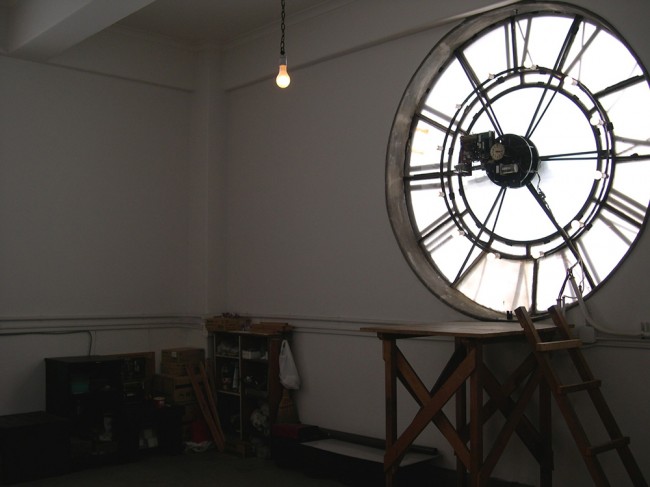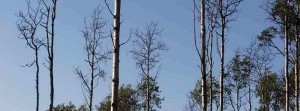
Future Past
When I was 20 I moved into a remote cabin in the mountains outside Smithers. I lived there five years. I’d grown up in the flat country in the eastern part of the continent and I’d found it pretty boring. I’d longed for mountain life and wilderness experience since I was small.
Because everything was so new to me, and my new life so exciting, I started keeping a journal. Besides the events of daily life, I also faithfully recorded the weather each day. I learned a lot about my new environment by keen observation.
But one of the most interesting things I observed was about myself. I noticed that, after only one year of mountain life, I was quick to make sweeping generalizations about what the weather would be like, based solely on my very limited experience of it. I found myself making statements like, “It’s usually hot and sunny in the middle of June,” or “We usually get three feet of snow in January.” Looking back on it later, I realized that I did not yet have enough experience here to be saying “usually” when talking about the weather. As subsequent years unfolded I learned that the weather during my first year here was actually not usual.
As time passed I noticed other people drawing conclusions from limited experience.
My sister-in-law and her husband, both avid skiers, moved here partly because we get so much snow…or so they thought. They had visited the area in the winter of 1996-97, which was a record-breaker for snowfalls and snow depth. They were mystified for several years after they moved here why we weren’t getting the “normal” amount of snow.
Our real understanding and belief about reality is sometimes based on our experience—as limited as that may be—rather than on outside information, like what people tell us. For example, my youngest daughter was home-schooled for the first few years. One day she went to school with a friend in Grade 2 to see what it was like. It happened to be the last day of school before the Christmas break, so the time was filled with games, treats, presents and other Christmas fun. When she came home that afternoon she confronted us. “You guys haven’t been telling me the truth about school!” she said. We explained that she hadn’t been there on a typical day—that school is usually not like that. “Oh, yes it is,” she asserted. “I was there!” No amount of reasoning could shake the certainty of her experience.
Rudyard Kipling summarizes our disposition for basing expectations on limited experience in this short poem:
In August was the jackal born;
The rains fell in September.
Said he, “A storm the likes of this
I simply can’t remember!”
It turns out that it is a common human trait to make conclusions based on insufficient evidence. Psychologists have recognized and studied this tendency (which they refer to as “jumping to conclusion bias”), identified the brain pathways involved, and believe it contributes to our long-term survival. This can work against us, though, as when a doctor jumps to the wrong conclusion—an unsettlingly common phenomenon that has also been studied a great deal.
Our inclination to jump to conclusions is also the basis for much humour. We are led to a point where we make a mental leap to the wrong conclusion, then are delightfully surprised at our mistake.
Marketer Neil Patel has written about the psychology of anticipation. He asserts that the cerebellum, the small part of our brain at the base of the skull, is where our feelings of anticipation or expectation come from. He says that studies have shown that people anticipate positive experiences more than negative ones. “In the absence of anxious or depressive psychological disorders, people automatically anticipate happiness more than they do sadness. It doesn’t matter if you’re an optimist or a pessimist; the brain is wired to anticipate positive experiences.”
Arriving with expectations
When I moved to my cabin in the woods, I had expectations of what life in the mountains and in “the North” would be like. For one, I was sure that winters would be unfailingly cold and snowy. I was surprised and greatly disappointed when, after the first cold spell, the temperature warmed above freezing and rain fell. How could this be? It took years before I realized that this is actually the norm: in my 40+ years here there has not been a winter without it. And a quick check of Environment Canada’s records confirm that there’s been rain in the Smithers area every winter since 1942, when they started keeping records here.
This is another way we anticipate the future, by basing it on our pre-conceptions. I have talked with many people over the years, relative newcomers, who have been shocked to see rain falling on the beautiful winter snowpack. It’s difficult to persuade them that it’s the rule rather than the exception when it doesn’t match what they expected.
Most locals are surprised, as I was, to learn that moose have not lived in this area “since time immemorial,” as I had assumed, but moved in to the Central Interior in the early 1900s. It was not until several decades later that moose reached the north and central coast. I always figured that any animals that were here when I arrived must have been here forever. Nowadays, the moose population in these parts is declining and herds of elk are making inroads into former moose habitat in the Bulkley Valley.
The revelation that populations of animals may be transitory on the landscape over time gives me a new perspective on our natural environment. Perhaps this is the norm: that some species move through an area but don’t stay long; and some move in and take up long-term residence, possibly forcing others out. Some of this is driven by our changing climate—something that has been taking place over the past 10,000 years at least, but even more rapidly in the past 100. If we look at species composition at any given time as fixed, we will be fooled; it has apparently been changing and will continue to change as we move into the future.
People in BC have come to expect that our summer skies should not be smoke-filled. But Okanagan writer Harold Rhenisch believes that fires in BC’s Interior are the historical norm. “Smoke, such as obscured Okanagan Lake recently, is the natural form of summer,” he says. For thousands of years there have been naturally-occurring forest fires, and First Nations have used fire to manage vegetation for food production. He believes our fire-suppression philosophy and practices set us up for catastrophic fire events, and that we need to change our expectations around fire. “Fire is here to stay,” he says.
Traumatic experience
We have a hard time imagining that major, potentially catastrophic things could happen where we live when we have not experienced them before. People continue to settle on flood plains, build cities on seashores where rising sea levels will invade, and build tall buildings on seismic fault lines. We can be told about the dangers of these activities, but if we haven’t experienced them ourselves we have a hard time being serious about preparing for them. It is hard to convince ourselves that things will not just stay the same.
After an event like a flood or earthquake, those who experienced it are hyper-aware and often fearful of the possibility of it happening again, while others who move to the same area later would not feel the same urgency, even though they are living with the same level of threat. After a generation has come and gone, people are likely to become blasé about such dangers, even though the potential for calamity may be as great or greater than before.
More than weather
We’ve seen that people predict the future, or at least set their expectations for it, based at least in part on personal experience and preconceived notions. We get more accurate in our expectations when we have more experience, especially if we are in one place for a long time. With more than 40 Bulkley Valley winters behind me, I probably have more realistic expectations weather-wise than someone who’s lived here just five years, but my experience pales beside true old-timers who’ve seen 80 years or more.
Living in one place for a long time has many advantages. We get a physical sense of time passing as we see trees grow, glaciers recede, rivers change course. And I think there are even more advantages if we live in small communities like those spread out along Highway 16. Here we can witness the evolution, flow and fabric of community life, which in turn helps inform us on the nature of human relationships and what we can expect from them. I have been heartened by some of what I’ve learned about the long-term nature of these relationships.
I’ve found, for example, that when we’ve had a falling-out with a friend or colleague, it may feel like we’ve lost that relationship forever. But over the course of time—it might even be ten years or more—people often move on from their former position and resume former friendships. There are people I have felt a dislike for or had a bias against, but years later see them in a different light, and in fact may not even remember what it was that bothered me about them in the first place.
One of the dynamics at work here is that our small communities force us to keep rubbing shoulders with one another; we can’t so easily just walk away and ignore people. In the process we get a chance to see aspects of others we hadn’t formerly known. From these experiences I’ve learned to be patient with relationships, to allow that there’s a likelihood that things will change for the better. And I think that the nature of small towns naturally fosters this.
How good are we at predicting the future?
“No sensible decision can be made any longer without taking into account not only the world as it is, but the world as it will be.”
These words from Isaac Asimov sound wise, but how good are we, really, at anticipating what’s coming? Our past experience and present reality create a bias that makes it difficult to see ahead.
When it comes to technology, we can usually only imagine something a little fancier than what we currently have. This quote from Popular Mechanics in March, 1949 illustrates this:
“Where a calculator on the ENIAC is equipped with 18,000 vacuum tubes and weighs 30 tons, computers in the future may have only 1,000 vacuum tubes and perhaps weigh 1.5 tons.”
Who could have predicted that, by 2018, nearly half of the world’s population would own a computer that fits on their lap or in their hand and is many times more powerful than the 30-ton model of 65 years ago? Who could have predicted the Internet and the instant access to information and communication that it provides? And who could have predicted social media and the way it’s changing how we relate to each other—something that even now we are trying to understand?
Clearly, we are ill equipped to anticipate changes that don’t resemble what we already know. Bill Gates, in The Road Ahead, says, “We always overestimate the change that will occur in the next two years and underestimate the change that will occur in the next 10.”
Information technologist Donald Latumahina talks about anticipating the future by analyzing the past. “The world is changing at increasing speed. In such a world, our ability to anticipate the future is very important.” He recommends that we “connect the dots” from the past through the present to form our expectations of what’s coming.
So I’ll go out on a limb here and make some predictions for our area, connecting the dots from my experience. I think the glaciers will continue to recede, and the rivers will continue to reach new summertime lows. Winters in the interior will continue to have rainy spells, and these will gradually become more frequent. Our towns will continue to gradually grow, while retaining many of the benefits of small communities. For the most part we will continue to get along with the people we share our local world with, and we might even get better at it than we are now.
I also think that the natural systems that support us are showing signs of wear-and-tear; our climate and the world around us are changing so unbelievably fast that it’s a bit scary. It would be surprising if there are not some challenging times ahead. But I’ll leave the last word to John Lennon, who made this optimistic prediction about the future:
“Everything will be okay at the end. If it isn’t okay, it’s not the end.”



